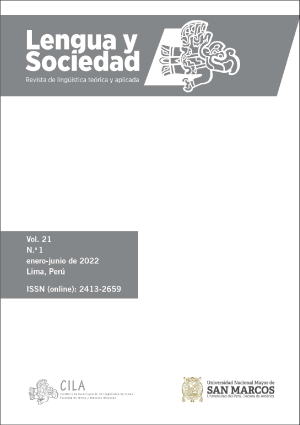Linguistic Attitudes towards British and American English in students of the English Specialty of San Marcos University
DOI:
https://doi.org/10.15381/lengsoc.v21i1.22477Keywords:
affective cognitive, behavioral linguistic attitudes, learning strategiesAbstract
The objective of this research is to address the phenomenon of linguistic attitudes in students of the specialty of English. This will make it possible to distinguish the attitudes of learners regarding American English and British English in Spanish-speaking contexts. The study of linguistic attitudes is relevant in sociolinguistics because the wealth of information on the functioning of the language is in its social relationship with the community” (Holmes, 2013, pp. 1-2). Thus, this type of work comprises three areas: cognitive, behavioral and affective attitudes (Zanna and Rempet, 1988), which are considered in this study. The mask method survey and observation will be used as a means of investigation. The linguistic attitudes of the students of the English major at UNMSM regarding American and British English are positive due to the prestige that both languages have and because of the integrative and instrumental attitudinal motivations. Regarding the sociolinguistic variables in relation to attitudes, it has only been possible to find a relationship of significant influence in age. In the analysis of the technique of the masks, a higher average of acceptance was evidenced in almost all the attributes with respect to British English.
References
Álvarez, J. y Jurgenson, G. (2003). Cómo hacer investigación cualitativa. Paidós.
Brown, D. (2000). La dimensión afectiva en el aprendizaje de idiomas. Cambridge University Press.
Falcón, P. y Esquivel, J. (2020). Actitudes lingüísticas de migrantes andinos en áreas sociodemográficas de lenguas en contacto. Lengua y Sociedad, 19(2), 79-91. https://doi.org/10.15381/lengsoc.v19i2.22305
Fasold, R. (1993). On attitudes, the driving force in EFL and ESL studies. Visor Libros, S. L.
Fasold, R. (1996). La sociolingüística de la sociedad. Introducción a la Sociolingüística. Visor Libros.
Fernández, T. (1999). Cómo recuperar una lengua minoritaria. Ariel.
Gardner, R. (1985). Attitudes and motivation. En A. Mackey (Ed.), Annual Review of applied linguistics (pp. 135-148). Cambridge University Press.
Gardner, R. y Lambert, W. (1972). Motivational variables in second language acquisition. En R. C. Gardner y W. Lamberts (Eds.), Attitudes and motivation in second language learning (pp. 119-216). Newbury House.
Hernández-Sampiere, F. y Baptista, P. (2008). Metodología de la Investigación (6.a ed.). McGraw Hill Education.
Holmes, J. (2013). An introduction to sociolinguistics. Editorial Pearson Education Limited.
Holmes, J. (1992). An Introduction to Sociolinguistics. Editorial Pearson Education Limited.
Huamán, J. (2021). Causas del bajo dominio del idioma inglés en los estudiantes de secundaria de la Educación Básica Regular en el Perú. Lengua y Sociedad, 20(1), 125-144. https://doi.org/10.15381/lengsoc.v11i1.22272
Johnson, R.; Onwuegbuzie, A., Turner, L, (2006). Towards a definition of mixed methods research. Journal of Mixed Methods Research, 1, 112-133 en Hernandez, R.; Fernandez C., Baptista, P. (2010). Metodología de la Investigación. McGraw Hill.
Lambert, W. y Lambert, W. (1964). Social psychology. Prentice Hall.
Lambert, W., Hodson, R., Gardner, R. y Fillenbaum, S. (1960). Evalutional reaction to spoken language. Journal of Abnormal and Social Psychology, 60(1), 44-51. https://doi.apa.org/doi/10.1037/h0044430
López, H. (2004). Sociolingüística. Editorial Gredos.
López, H. (2015). Sociolingüística. Editorial Gredos.
Meyerhoff, M. (2006). Introducing sociolinguistics. Routledge Publisher.
Quesada, M. (2008). De la norma monocéntrica a la norma policéntrica en español. Algunas reflexiones históricas según testimonio y actitudes lingüísticas [Presentación en papel]. II Congreso Nacional: Multiculturalidad y norma policéntrica: Aplicaciones en el aula de ELE. http://www.mecd.gob.es/dctm/redele/Material-RedEle/
Richards, J. y Schmidt, R. (2002). Dictionary of Language Teaching & Applied Linguistics (3.a ed.). Longman.
Salazar, A. (2014). El prestigio frente a la identidad: las actitudes lingüísticas de los monterianos hacia el español hablado en Montería. Cuadernos de Lingüística Hispánica (25), 39-55. https://doi.org/10.19053/0121053X.3370
Silva-Corvalán, C. y Enrique-Arias, A. (2017). Sociolingüística y pragmática del español. University Press.
Terry, R. (2021). Los problemas de reexpresión en la traducción hacia la lengua materna. Lengua y Sociedad, 20(2), 333-358. https://doi.org/10.15381/lengsoc.v20i2.22256
Wenden, A. (1999). An introduction to Metacognitive Knowledge and Belief in Language Learning: beyond the basics, 27(4), 435-441. https://doi.org/10.1016/S0346-251X(99)00043-3
Zanna, M. y Rempel, J. (1988). Predicting Prejudicial Attitudes: the Importance of Affect, Cognition, and the Feeling-Belief Dimension. En D. Bar-Tal y A. W. Kruglanski (Eds.), The social psychology of knowledge (pp. 315-334). Cambridge University Press.
Downloads
Published
Issue
Section
License
Copyright (c) 2022 Yony Cárdenas Cornelio, jorge Esquivel Villafana

This work is licensed under a Creative Commons Attribution 4.0 International License.
AUTHORS RETAIN THEIR RIGHTS
a. Authors retain their trade mark rights and patent, and also on any process or procedure described in the article.
b. Authors can submit to the journal Lengua y Sociedad, papers disseminated as pre-print in repositories. This should be made known in the cover letter.
c. Authors retain their right to share, copy, distribute, perform and publicly communicate their article (eg, to place their article in an institutional repository or publish it in a book), with an acknowledgment of its initial publication in the journal Lengua y Sociedad.
d. Authors retain theirs right to make a subsequent publication of their work, to use the article or any part thereof (eg a compilation of his papers, lecture notes, thesis, or a book), always indicating its initial publication in the journal Lengua y Sociedad (the originator of the work, journal, volume, number and date).






